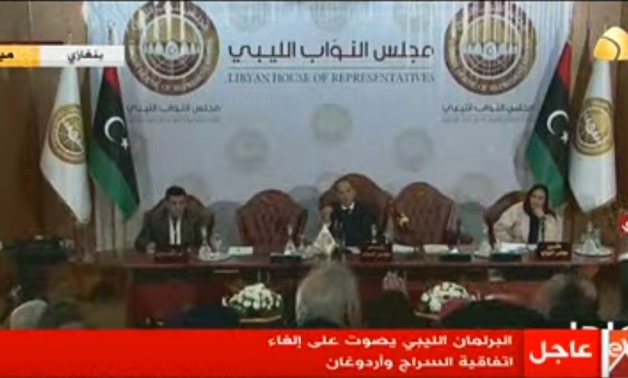
The Libyan Parliament votes unanimously to reject a memorandum of understanding (MoU) between Chairman of the Libyan Presidential Council (PC) Fayez al Sarraj and Turkish government - Screenshot of Extra TV Channel
CAIRO – 4 January 2020: The Libyan Parliament has voted unanimously to reject a memorandum of understanding (MoU) recently inked between Chairman of the Libyan Presidential Council (PC) Fayez al Sarraj and Turkish government, which allows the latter to send troops to Libya.
During Saturday’s emergency session, the parliament also voted to refer all the signatories of both agreements signed by Turkish President Erdogan and Sarraj on security as well as maritime jurisdictions, to the Libyan top prosecutor on charges of high treason.
The voting session came after the head of the Libyan National Army Khalifa Haftar made a televised speech, and called on all Libyans to take up arms in response to a prospective military intervention from Turkey.
Last week, Turkey’s Parliament voted for Turkish President Recep Tayyip Erdogan’s proposal to send Turkish troops to Libya, in what was seen as an escalation that would deepen the Libyan crisis and mount tensions in the Middle East and North Africa.
A number of parliamentarians further demanded the withdrawal of Libyan citizenship from the signatories of the two agreements and called upon the international community to reject the MoUs.
Egypt has condemned the two MoUs as “null and void,” and warned against any Turkish military intervention in Libya, and its repercussions.
The MoUs were described by many Arab states as a blatant violation to all the international accords and UNSC resolutions, especially 1970 resolution, issued in 2011, which created Libya Sanctions Committee and banned any arms supply to and military cooperation with the war-torn North African country unless such actions were approved by the committee.
During an extraordinary meeting for the Arab League (AL) Council on Dec. 31, Egypt has affirmed its stance regarding the Libyan crisis.

Comments
Leave a Comment